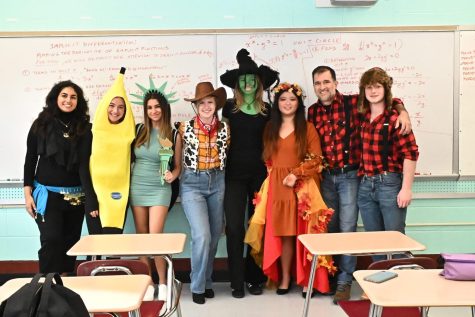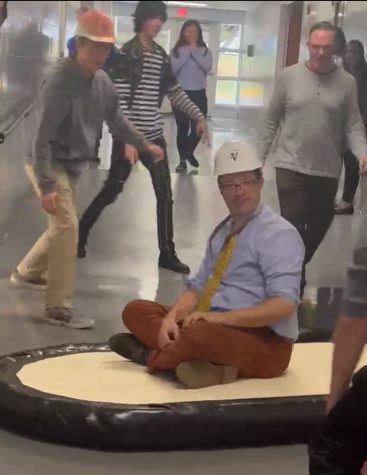New Class at VHS: The American Promise: Power, Equality, and Freedom
Verona High School is lucky to have lots of great classes and even better teachers. Next year, two of VHS’s best will teach a new course called The American Promise: Power, Equality and Freedom. Mrs. Wallerstein and Ms. Sepcie will teach and write the curriculum for this half year course, which is available to all students of any grade level. You can find the generic course description in the Program of Studies, but I talked to Ms. Sepcie about where the idea for this class came from, who it’s for and what it’s all about.
What is the new class about? Who is it available to?
The course description for the class is as follows:
“In this one semester elective course, students will better understand the complexity of racial dynamics in the United States today. Using case studies, discussions, and various research projects, students will analyze the degree to which the ideals of freedom and equality have been upheld in America. Course content will be flexible based on student interest and current events but will focus on the following themes: power and privilege, property ownership and wealth, criminal justice, societal norms, and popular culture.”
In short, this class is about the other side of “white man’s history.” It is about the promise of equality made to Americans in 1776, and those to whom this promise has or has not been kept. It is about American history from the perspective of the people without power. The purpose is to show students the other side of the story from the perspective of people of color, immigrants, women and the underclass. It is not a class based on politics or opinions, but on facts. This awesome course will be available to all grades, and has no prerequisites.
What inspired this class?
Ms. Sepcie explained that this class was the brainchild of Mrs. Wallerstein, Humanities Supervisor Mr. Schels, and herself. She says that, “The genesis for the class really came from a lot of talk about race, and how we’re addressing it, and whether it’s reaching everyone.” In the face of rising racial discrimination and tension in our country, the three “felt like [they] needed to do more.” But, she says, “It really is more than just race.” Ms. Sepcie says the title and topics were intended to be broad in order to encompass everything from gender to race to status. But, it all comes down to three things: “who has power, to what degree is there equality, and to what degree is there freedom”.
What exactly is the “American Promise” and is it a promise that has been kept?
Former President Barack Obama said that the American Promise “… is that promise that has always set this country apart — that through hard work and sacrifice, each of us can pursue our individual dreams but still come together as one American family, to ensure that the next generation can pursue their dreams as well”. Contrary to the course title, Ms. Sepcie said that the class is not truly about whether, in fact, that promise has been kept. It is instead about how we got from Point A to B, and everything that happened in between. She was specific that it is a class based in fact, and it is about people coming to their own conclusions and developing their own viewpoints based on the information. One requirement for this course is definitely an open mind. However, she also specifically said that, “Some things are opinions, some things are not,” referencing systemic racism in America. The course is about what has changed in America, what has gotten better throughout history, what has not, and how it all relates to everyday people.
From a general historical perspective, what do you think we should be learning more about in history curriculum?
Ms. Sepcie strongly voiced that there needs to be a “a less Eurocentric view, and certainly in American history, I think there needs to not be so much white man history.” And apparently, lots of history teachers agree. Ms. Sepcie remarked that when the College Board, (the dreaded AP administrators that are universally hated by high schoolers) tries to alter history curriculum to be more Eurocentric, which is often, there is a lot of pushback from teachers. Of course, some people would rather teach that African history began with the Transatlantic Slave Trade, or that Europeans created everything from Algebra to money. However, unbeknownst to most people, there is a fierce community of history teachers taking a stand for a diverse curriculum.
Furthermore, Ms. Sepcie said in her own high school, she felt that the story was always about rich, white male power. “You wrestle with the idea that that’s who had the power, so it really is unfortunately that story, but there is still another voice there that I always felt was kind of excluded” she says. She specifically mentioned a desire for more lessons on the underclass, black history and the LGBTQ+ community, who are often left out of the story. She hopes the new course will help bring those forgotten voices into the conversation.
Why do you think learning about topics like racial dynamics and privilege in school is important?
Courses like The American Promise are the very reason why school is so important. For many students, school is the only place they ever hear about issues like racial justice or privilege, making it an essential topic to cover. Ms. Sepcie recognized this, and said it should be treated as a mandatory class like Financial Literacy. She says, “At least if it’s in school… the same way they say they should know how to balance a checkbook… I also think they should know how to have empathy for other people, and look at the other side of the coin, and recognize the privilege that you have and people who maybe didn’t have that.” Life really is about understanding people that are different from you, and the history behind those people is something to be prioritized in schools. “I would love it if it was a graduation requirement, and earlier rather than later… I would think it should be our goal to have understanding about other people… and freedom and liberty.”













